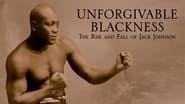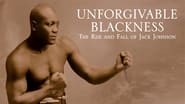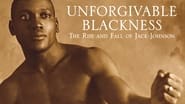MartinHafer
This is an amazingly long and detailed biography about the first black heavyweight boxing champion, Jack Johnson. In an era where blacks were, at best, second-rate citizens, Johnson had a brashness and arrogance that made it even more difficult for white America to accept him. And, incidentally, many black Americans disliked him as well. This was because he slept with prostitutes--many of them. And, many of these women were white--a sin which few seemed willing to forgive. As a result, even though he was the undisputed champ, he was often reviled. Many will be amazed at just how horrid the hatred was--with vile comments by supposedly upright citizens and newspaper accounts that are embarrassingly hateful. What happened next, you'll just need to see for yourself--but much of Johnson's downfall, unfortunately, was his own doing."Unforgivable Blackness" is a perfect or near perfect film. Some might balk at the great length of the film, but is grand style and quality are apparent throughout the movie. Incidentally, if you want to see more about this amazing but flawed man, try watching "The Great White Hope" with James Earl Jones, a slight reworking of the story of Johnson.By the way, it's not a major beef, but this show repeats a very commonly accepted myth. While President Woodrow Wilson was a horrible man (don't even get me started...), the comments he supposedly made after seeing the racist film "Birth of a Nation" were actually never made. The Writer Thomas Dixon apparently made up this quote. Do a little research on the web, you'll see what I mean.Also, although they never mentioned it in the film, it was illegal for a black and white couple to marry in many states in the US at the time and remained so until the early 1960s. Sad.
Roncarol-1
As a youngster I heard about this man Jack Johnson. Even then I thought those same stories were fiction. Afterall, no one could convince me that, in the early 1900's a black, Negro, could have possibly conducted his life in such a way to disdain social mores not only to the degree in and of itself, but more so in his audacity.Marrying and dating white women?? Come on. And he did not get killed? It shows that even for those times, America had this certain elasticity in dealing with a unique personality such as Johnson's.This movie weaves his life thoughtfully, slowly (a 2 disc set after all) and with dignity. The voices that contributed to this story is so widely varied that I implore you to check the movie's credits. From Ed Harris, Kevin Conway, Samuel L. Jackson and the lead narrator, Keith David. But these voices aren't the complete range of contributors. For this kind of talent to come together is a testament to the power of the story and the pull that director Ken Burns commands.Unforgivable Blackness ... is a powerful, thought provoking part of the American Experience. To that end, PBS deserves continued credit for bringing history to the masses.Humbly Submitted and with deep emotions, Ron W.
blanche-2
Ken Burns has done an amazing documentary on the life of Jack Johnson -but even more amazing is the story he tells of the times in which Johnson lived. There is still racism in this country, for sure - one wants to believe that at least in most parts of the country, it is a little more circumspect than racism was during Johnson's life. This documentary provides a truly astounding look at this country at the beginning of the century, and a lot of it is unattractive. Johnson, called "The Ethiopian," could not go after the heavyweight title because the white fighters swore no black man would ever have it. When he finally did get it, Jim Jefferson, the undefeated champion, who had refused to fight Johnson, was dragged out of retirement 10 years and 100 pounds later to try to reclaim the title. He failed, and commented that in his prime, he could never have beat Johnson.In his belief system, Johnson came up against a contemporary, Booker T. Washington, who believed that, rather than worry about segregation, blacks should build a power, education, and money base first. Johnson preferred to live as if segregation did not exist. He lived in white neighborhoods, moved his mother into one, flaunted his money, and consorted with white women. His quest for individualism cost him dearly. He bucked a system that simply would not stand for it.This is a fascinating piece of our history, one that should not be missed.
threedy
ARE SPOILERS POSSIBLE FOR HISTORICAL DOCUMENTARIES? IF SO, THERE MAY BE SOME HERE.This inaccurate, intellectually dishonest propaganda puff piece represents a new low for ultra-PCers Burns and Ward. They have done their mightiest to make a hero out of a self-indulgent thug, making a mockery out of historical reporting in the process.Jack Johnson was indeed a man of the future: he would fit right in with the egomaniacal, spoiled-rotten sports "heroes" that are so prevalent today. In a sense, he had great courage, demanding liberties and privileges that the society of his day (virulently racist, by today's standards) considered monumental affronts. But his brand of courage was more a form of supreme gall, borne by an overbearing sense of special entitlement. There can be little doubt his behavior promoted racism by appearing to confirm the worst fears whites held toward black men – that they were, at heart, irresponsible brutes with an insatiable lust for white women. Contrary to the subliminal thesis here, Johnson was anything but a social reformer blazing a trail to freedom.Other heroic qualities are magnified out of proportion here, with editorial sleights-of-hand. Johnson's quotes come almost entirely from a ghost-written autobiography, making him appear more articulate than he really was. The herculean physical courage attributed to him is not confirmed by the facts: His first three fights after winning the belt in 1908 (McLaglan, O'Brien, Ross) were six-round, no-decision exhibitions; the fourth (Kaufman) was a ten-rounder of the same variety. The fifth was supposed to be an exhibition, but middleweight Stanley Ketchel got too frisky, so Johnson sent him to the oral surgeon. The phony nature of these fights goes unnoticed by the documentary, except for the Ketchel episode.Thus, Johnson's first real title defense was the 1910 bout against Jeffries, who had not fought in six years. Johnson held the crown for five years after this, during which he made only four defenses. By contrast, the man he dethroned – Tommy Burns – had made 12 defenses in the previous two years. (Interestingly, Burns weighed only 168 for the Johnson fight, about 10% below his normal fighting weight.) The film apparently ignores only one of Johnson's fights as champion – a draw. That seems to be a telling omission. (Perhaps it was mentioned in passing ; I DID blink a couple of times.)In the end, Johnson was toppled by untalented strongman Jess Willard, and here Burns & Ward go unbelievably astray. They ascertain Willard was 27 at the time, "a full decade younger" than the champion. The challenger was actually 33, a fact Burns & Ward obliquely acknowledge earlier, if your arithmetic is better than theirs. They note at one place Willard began his boxing career the day after the Johnson-Jeffries fight (1910); a little later, they report Willard started boxing at 27. That would have made him 32 at Havana in 1915 – almost correct.Was Johnson unmercifully persecuted by the government, as Burns & Ward claim? Yes and no. While the Mann Act was not inspired by the practice of rich men traveling with their in-house concubines, Johnson was clearly guilty of violating it. His selective prosecution probably had some racial motivation, but Johnson's violations were so blatant and well-publicized, he might well have been prosecuted if he had been white.Ken Burns' Civil War series (1990) was criticized by the PC lobby for being insufficiently anti-Confederate and driven by a white southerner (Shelby Foote). Ever since, he has been an increasingly obsequious afro-centric. It is getting pretty tedious.






